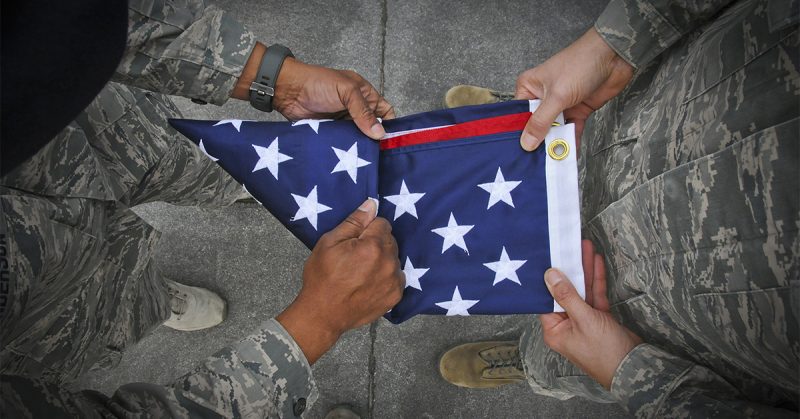Sometimes adulting is hard. It’s taking a right to go to work instead of taking a left to go to the beach. It’s paying bills on time, cleaning the house because we know no one else will do it, making all those well checkups at the clinic, and paperwork — so much of adulting is paperwork. Two such forms in the military world — DD Form 93 (Record of Emergency Data) and the Family Care Plan — aren’t necessarily widely known among military spouses, and they don’t get a lot of mention between service members and their spouses.
My theory on why these forms don’t come up more in military marriages is that they cover one of the worst parts of adulting — the unthinkable, the military spouse’s worst nightmare. That doesn’t exactly make for light dinnertime or date night conversation. But, it’s so necessary. Ignoring the topic doesn’t make it less likely to happen, it just makes us less prepared in the event that something ever does happen to our service member. It’s crucial to ensure that your service member keeps these forms up to date like insurance — they’re no different than the insurance you have on your car or home. You have this insurance not because you expect something bad will happen — quite the opposite, you hope nothing happens, ― but you have the insurance just in case because it’s responsible to plan for unlikely scenarios to make sure we’re taken care of.
DD Form 93: Record of Emergency Data
You’ll hear this form go by a few different names: DD Form 93, DD 93, Record of Emergency Data, or RED. This form has two purposes: to designate who should be notified if a service member is injured, missing, captured or dies and to designate beneficiaries.
If the unthinkable happens, this is where casualty personnel will look for names and addresses for notification. Because so much of military life is moving, the address listed for the military spouse is constantly changing, which means this form should be updated following every move.
This form also has a line for each of the service member’s children. So, if you have a new baby, it’s time to update the Record of Emergency Data to include the new family member. Service members can also list parents and opt not to inform certain people for ill health.
The second part of DD Form 93 is designating beneficiaries for death gratuity. This can include more than one person — like spouse and each child or both a mother and father if parents are divorced. Service members give each beneficiary listed a percentage of the benefit up to 100%.
DD Form 93 is applicable to all service members, whether they’re married, divorced or have never been married. Ideally, this form would get at least a scan annually, making sure that everything is still up to date. At the very least, this form should be updated with milestones like moves, deployments, marriages, births or the death of a family member listed on the Record of Emergency Data.
Family Care Plan
Information covered in DD Form 93 is mostly clear cut, but the Family Care Plan (often just referred to as the FCP because the military loves acronyms) gives us the chance to designate two caregivers. This person (and the alternate) is the one we would want next to us at our very worst — from hour one — if something were to happen to our service member. This person needs to be local (or able to get to you in a matter of hours — even better if it’s only a matter of minutes) and someone we know well and trust to respect our best interests. The caregiver would be emotional support and the bouncer at the door — keeping anyone we wouldn’t want to see away. This is the person who would be what we need even when we might not know what that is.
The person we list as our caregiver wouldn’t just be for us but for our kids too. If we are lucky enough to have that friend at a duty station who our kids consider that honorary aunt or uncle, we have a good caregiver candidate.
Because we (military spouses) would be the one depending on this caregiver, it makes sense that we would have the ultimate say in who this person is. Each time we PCS (or our named caregiver PCSes), this form needs to be updated.
Major Takeaways
The responsibility to update either of these forms ultimately falls on the service member, but that doesn’t mean that military spouses can’t bring them up or be a part of the updating process. We should have a say in who would be sitting next to us in that hypothetical worst moment of our lives.
Our service members update these forms electronically, but we can access older versions of DD Form 93 and the Family Care Plan online so we know exactly what needs to be updated. In general, this means full names, dates of birth, phone numbers, and addresses for named beneficiaries on DD Form 93, and full names, phone numbers, addresses, and emails for named caregivers on the Family Care Plan. Providing all of that information to your service member removes one excuse for not updating the forms.
While it’s preached that these forms should be regularly updated, they tend to become backburner material because they are “just in case,” and that brief due in the morning, flight prep, or training for the PFT often rank higher in priority because they have hard deadlines attached. I know the topics covered on these forms are scary. It’s easier not to think about them at all and pretend nothing like this would ever happen to us, but bringing these topics up once a year or once a PCS, at the very least, keeps us on the same page as our service member. Wouldn’t you rather have a plan and never need it than have no plan when you need it the most?





